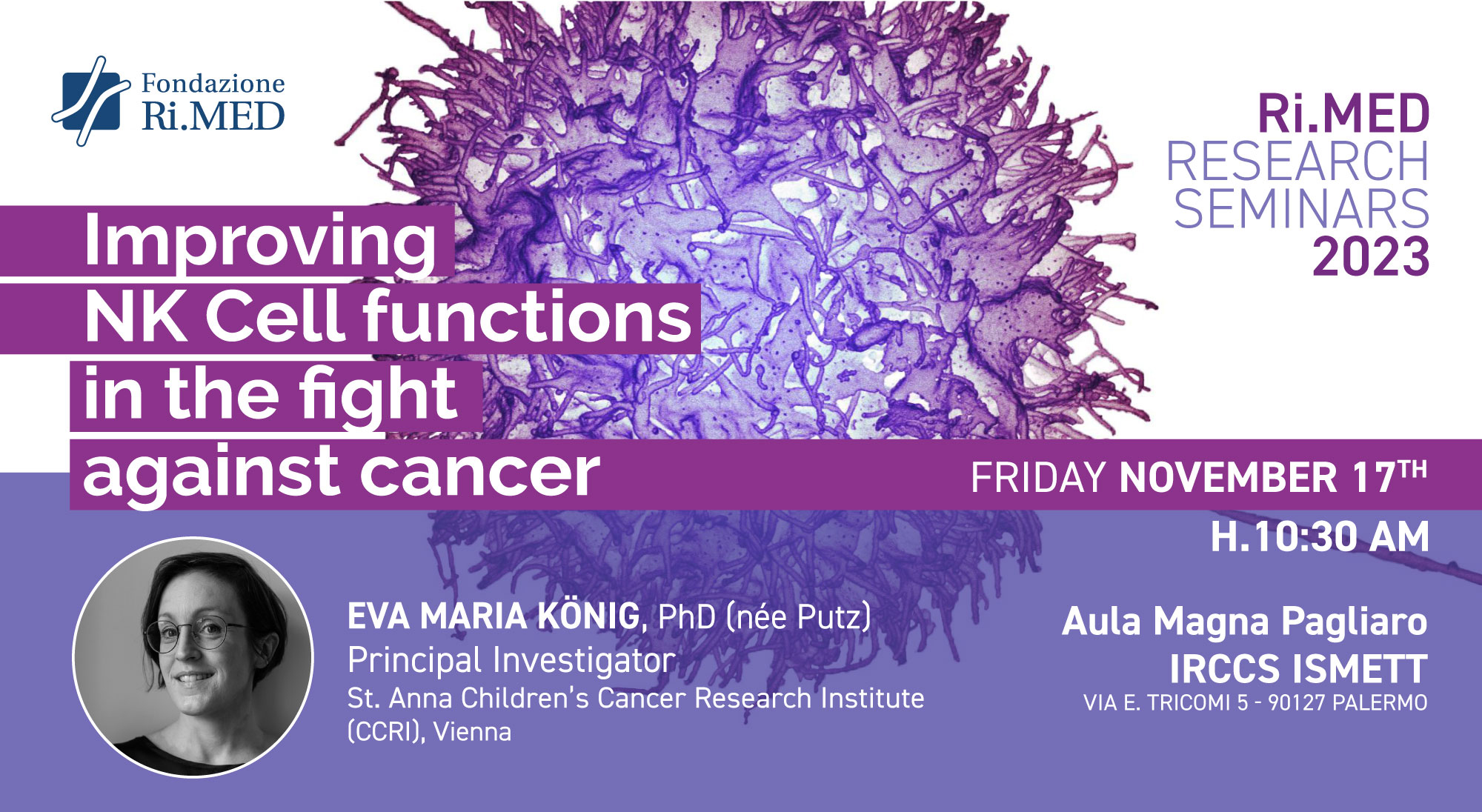The 8th Ri.MED Research Seminar took place on Friday 17th November at 10.00 am at “Aula Magna Pagliaro” IRCCS ISMETT, Via Tricomi, Palermo
Improving NK Cell functions in the fight against cancer
by Eva Maria Koenig, PhD
Principal Investigator, St. Anna Children’s Cancer Research Institute (CCRI)
Vienna, Austria
Attendance is free, but registration is required.
Please confirm your attendance by November 16, 2023, filling out the registration form below.
N.B.: in the section “Other” please select the date and then select how you want to participate – in presence or on remote.
ABSTRACT: Natural killer (NK) cells are part of the innate immune system and the first line defense against virally infected and transformed cancer cells. In the last years, immunotherapies aiming to leverage the body’s own immune cells in the fight against cancer have entered the stage of anti-cancer therapies with unprecedented success. While most studies focus on boosting T cells, we are aiming to find novel ways to potentiate NK cells’ anti-tumor functions. We have previously shown that inhibiting STAT1-S727 phosphorylation is a promising way to improve NK cell-mediated tumor surveillance in vivo (PMID: 23933255) and that STAT1 – a bona fide transcription factor – plays a so-far unresolved role at the immunological synapse of NK cells (PMID: 27757297). In our ongoing study, we now focus on serine/threonine kinase 38 and 38-like (STK38(L)), which we discovered to be in physical contact with STAT1 upon NK cell-target cell contact. Our preliminary data suggests that STK38(L) puts a break on NK cell cytotoxicity. We thus hypothesize that STK38(L) could represent a promising novel target to improve NK cell functionality. In addition, we investigate the general role of NK cells in tumor immunoediting. Here we employ DNA barcoding to trace individual tumor cells over time. This allows for the first time to show the existence of NK cell-mediated sculpting/editing of tumor cells in vitro. Finally, we study potential evasion mechanisms of tumor cells from NK cells. We have found several deregulated genes in NK cell-resistant tumor cells unveiling novel molecular targets as a basis for potential future treatment strategies. These targets are presently undergoing in-depth scrutiny and analysis. In a nutshell, our studies aim to find novel druggable targets to enhance the vulnerability of tumor cells towards NK cells and/or to improve NK cell functionality in the fight against cancer.
BIOSKETCH: Eva König has more than 16 years of experience in the field of tumor immunology. Following the completion of her undergraduate Chemistry studies at the University of Vienna, she pursued her Ph.D. in the laboratory of Professor Veronika Sexl at the Medical University of Vienna, and subsequently continued her research as a postdoctoral fellow in the laboratory of Professor Mark Smyth at the QIMR Berghofer Institute of Medical Research in Brisbane (Australia). Throughout her career, Eva has focused on advancing our understanding of cellular immunity and strategies for enhancing the anti-tumor capabilities of cytotoxic immune cells like natural killer (NK) and T cells. Using gene-modified mice and a wide array of in vitro and in vivo assays, she has uncovered innovative approaches to improve NK cell-mediated tumor surveillance, such as the inhibition of CDK8-mediated STAT1-S727 phosphorylation or CIS-mediated downregulation of IL-15 signaling. She has also shed light on potential challenges associated with drugs that impact NK cell migration (heparanase inhibitors) and T cell function (PI3Kδ inhibitors). Since 2019, Eva has led an independent research group at the St. Anna Children’s Cancer Research Institute (CCRI) in Vienna, Austria. Together with her team, she aims to find novel druggable targets to enhance the susceptibility of tumor cells towards NK cells and/or to boost NK cell functionality in the fight against cancer.
For info: adonath@fondazionerimed.com

